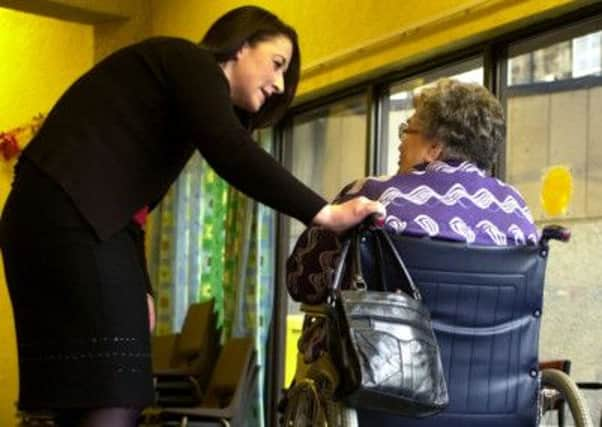Grant Woodward: Why quality care for our loved ones won’t come on the cheap


“You don’t think it’s got anything to do with grandma, do you?” I asked my mum. “I certainly hope not,” she said, her voice wavering with dread.
Over the course of the previous two years, my grandmother, a tough, no-nonsense North Easterner never afraid to speak her mind, had been transformed before our very eyes into a frightened and confused old woman.
Advertisement
Hide AdAdvertisement
Hide AdNow the fog of Alzheimer’s had convinced her it was a good idea to start a fire inside her new care home. “The bairns were cold,” she explained later, “so I tried to warm them up”.
The question was how had she managed to get access to the materials to start a fire? Who had been monitoring her to ensure she did not come to harm – or, in her muddled state, cause harm to others?
There is no guarantee that the installation of CCTV cameras in care homes, the step now being proposed by the Care Quality Commission’s chief inspector Andrea Sutcliffe, would have averted an incident like this. Yet there is enough concern over the standard of care afforded such vulnerable residents to justify the current calls for closer monitoring.
The covert filming at the Winterbourne View care home near Bristol, screened by Panorama a couple of years ago, exposed the sort of abuse that goes on in some homes.
Advertisement
Hide AdAdvertisement
Hide AdResidents were slapped and taunted, while one was teased about a suicide attempt. Experts told the programme what they had seen amounted to “torture”. Immediately after the broadcast, four of the staff were arrested.
In this case the victims were people with learning disabilities, but new figures prove concerns over similar treatment being meted out to the elderly are justified.
Statistics compiled by the Health and Social Care Information Centre show that the number of cases of alleged abuse referred for investigation by councils in England rose from 108,000 in 2011/12 to 112,000 over the last 12 months.
Of these, 45 per cent took place in a care home. The charity Age UK says it fears there are still many more cases that go unreported.
Advertisement
Hide AdAdvertisement
Hide AdIt means the appeal of installing CCTV cameras in every care home in the country is perfectly understandable. Relatives worried that their loved ones might be suffering ill-treatment would be given some reassurance. Poor care workers would leave as their failings became apparent.
There would also be less pressure on good carers to act as whistleblowers, with all the repercussions that can bring in terms of bullying, depression and at worse losing their job.
But how exactly would this work? Would it be the responsibility of the care home to monitor the system, or that of a totally independent body? Given that there are just short of 18,000 residential and nursing homes in the country, who would pay for the cameras and their upkeep? The care homes or the taxpayers?
Surely there is a better way. Firstly, would it not be far more effective and cost efficient to beef up the body responsible for inspections – namely the Care Quality Commission – in terms of its manpower and remit?
Advertisement
Hide AdAdvertisement
Hide AdAnd how about increasing the level of qualifications and training needed before someone can work in a care home?
Care home workers provide a vital service – this should be reflected in their pay. Can we really expect them to provide a first-class standard of care when they are not even being paid a decent wage?
The Government cannot keep expecting people to enter the profession purely out of a burning sense of vocation, just as private care homes should not be able to get away with paying some staff just a few pence above the hourly minimum wage.
This is an issue that must be tackled now. With councils desperately trying to save money by privatising care facilities, the private operators are fast establishing a near monopoly which means opportunities to earn a decent wage in this sector are in danger of vanishing completely.
Advertisement
Hide AdAdvertisement
Hide AdSocial care can be a rewarding job, but above all else it is a demanding one. If incidents of abuse and neglect are to be stamped out, then there must be a far greater onus on attracting good quality staff who want to be there, not people who are working long hours to try to make ends meet and are too tired to care.
If the pay issue isn’t addressed, then good quality carers will leave the profession in their droves for jobs that at least offer a wage they can live on.
With fees of around £350 a week for a place at a residential home and £450 for a nursing home, care home operators can surely afford to give them closer to what they are worth.
But then there needs to be a rethink in our attitudes towards the elderly in general.
Advertisement
Hide AdAdvertisement
Hide AdThe fact that we are living for longer – and the number of people with dementia is set to jump from its current 800,000 to over a million by 2021 – means later life care demands to be put under the microscope.
It will cost money, but if standards are to improve – and the elderly are to receive the level of care they are entitled to – then we simply cannot keep expecting to do it on the cheap.